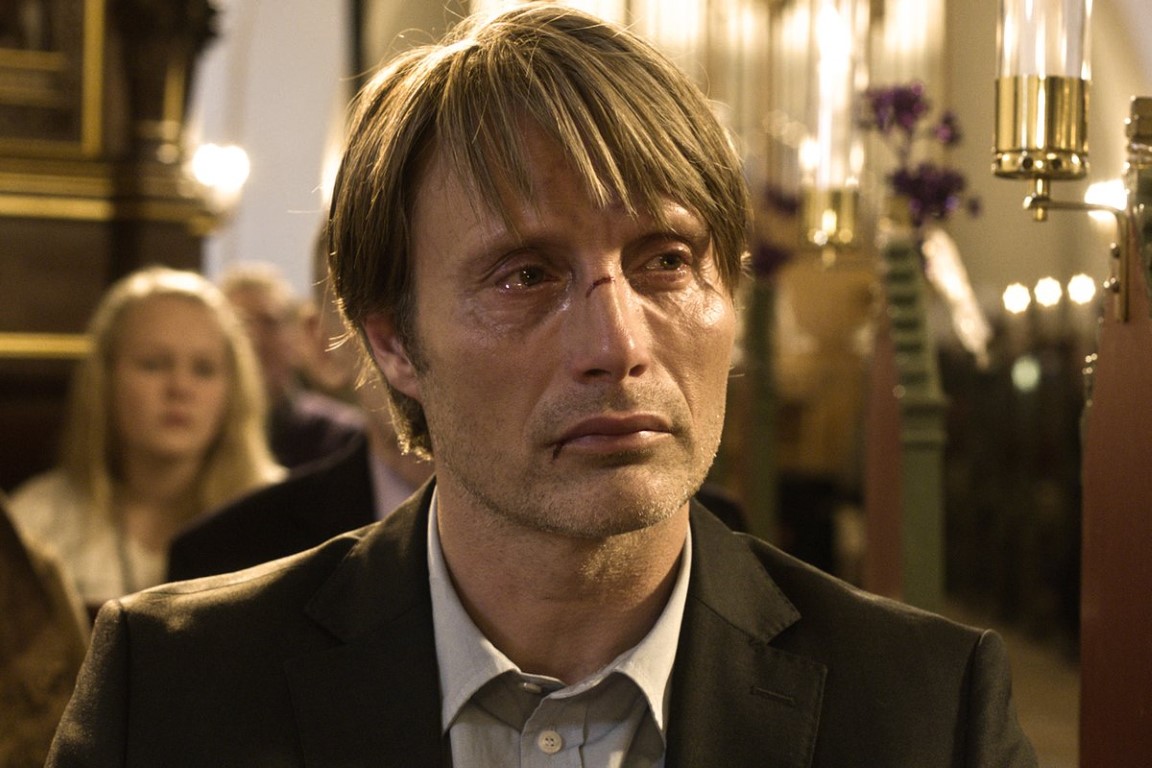
Movie review of Danish film ‘The Hunt’
By Janis McMath, Editor-in-Chief
5/5
One of the most famous real-life cases was the ‘McMartin Preschool Abuse Trial,’ in which children were nudged into answering certain ways through clearly leading questions and the promise of rewards.
This 2012 film is an accurate and disgusting representation of real life—showing exactly why due process is so vital. This dark drama is about a male teacher who is falsely accused of rape—and articles on similar real-life cases attest to how unfortunately authentic the tone of this movie is. (Note: SPOILERS AHEAD!)
The film is beautifully shot and unendingly unnerving. Close up shots of star Mads Mikkelsen (who plays Dr. Hannibal Lecter in Hannibal) bring you into his distress. The movie ensures that you feel as helpless as the protagonist. Lucas (played by Mikkelsen) is an elementary school teacher who forms a friendship with his student, five-year-old Klara. Lucas is much kinder than Klara’s parents and allows her to walk his dog—leading to her harbouring a crush on him. Klara pursues her crush on Lucas by surprising him with a kiss right on his lips; Lucas sternly explains to her how inappropriate this is, and Klara in turn becomes wildly hurt and angry.
In her childish hate, Klara tells another teacher that Lucas exposed himself to her—and that teacher then brings in a psychologist. The ugly situation is worsened by the fact that the psychologist asks a slew of leading questions—and this interview tactic has been a huge problem in many real false rape accusation cases. The following example highlights why this film is so accurate.
One of the most famous real-life cases was the “McMartin Preschool Abuse Trial,” in which children were nudged into answering certain ways through clearly leading questions and the promise of rewards. Children were even coached into saying the correct answers. The evidence was used in court and reported on by biased journalists who printed their accusations and permanently damaged the reputation of the accused. Even 20/20 did a special on this, blatantly taking the side of the prosecution before the case was over. Ray Buckey, the accused, spent five years in jail before being released. Up to 500 people protested during the trial, carrying signs that read “we believe the children.” Yet additional holes in the story were adding up—children’s stories were all inconsistent and utterly bizarre. Parents, and the majority of the public, were still steadfast in their feelings though. The fallout of this case and similar ones were not pretty; California daycares had to shut down because of hiked up insurance rates from insurance companies that feared molestation lawsuits—and laws around the US changed to restrict physical contact between caretakers and children.
The film portrays this public hysteria maddingly—and also shows the permanent and irreversible damage that is done to one’s reputation in my favourite scene in the film. Lucas is constantly being attacked by the small town, eventually leading to physical encounters with those who were once his friends. He is immediately deemed guilty by the whole town—and even his partner. Yet when it is revealed that the children all have inconsistent stories full of lies and Lucas is acquitted, the town slowly circulates him back into the community. My favourite scene in the entire film is the finisher; during a town deer-hunt, Lucas is shot at. He will never be seen the same way again. A 2014 article for the National Post on a BC teacher who faced similar false accusations of terrible sexual crimes shows that the problem is not far from home either. In the same article, a professor of education at McGill University, Jon Bradley, commented that “there’s none of this innocent until proven guilty. It’s far more, ‘We say you’re guilty, now prove you’re not.’” I would recommend this film to anyone looking for a very meaningful and utterly uncomfortable experience.


